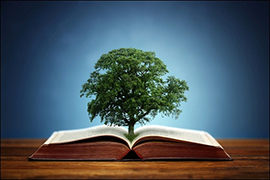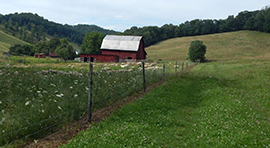College Professors Talk Importance of Private Land Conservation
By: Emily Nason
Posted on:05/08/2018 Updated:08/06/2018With less funding going towards the preservation of public lands, professors have started stressing the importance of private land conservation.

Over the past few years, environmental studies have become more and more popular in the world of academia. Growing populations and higher standards of living put increasing pressure on our environment. The study of how human beings affect nature, and what we can do to reverse the affects we’ve had, is more important than ever. But with less funding going towards the preservation of public lands, professors have started stressing the importance of private land conservation.
Two professors that see the real value in privately owned lands are Jake Brenner and Michael Drescher. Brenner is an associate professor in the Department of Environmental Studies and Sciences at Ithaca College. He recently co-authored an editorial with Drescher, associate professor at the University of Waterloo, about the need to maintain private land conservation programs. The editorial was part of a special feature he edited on private land conservation that was published in the journal “Ecology and Society.”
I was lucky enough to have a chance to speak with Both Professor Brenner and Professor Drescher about their views on conservation and why private lands shouldn’t be overlooked. Both agree that public lands are important, but much of the country is in the hands of private land owners. 71% of the lower 48 states is privately owned and they host the vast majority of both wetlands (82%) and endangered species habitats (80%).
“Private land conservation is important because so much of the world is in private hands, and the owners of those lands are potentially powerful agents of change--including management for sustainability.” –Jake Brenner
Both Drescher and Brenner pointed out that publicly protected lands cannot be the final answer to land conservation. Working lands have just as much ecological value and biodiversity as public lands. If landowners are given the tools to better maintain their own land then it would be a win-win, both for the environment and for the land owners themselves. Why? Because it’s their livelihood. It’s their number one priority. They will do whatever it takes to ensure that their land is healthy, successful, and fruitful.
“Some environmentally valuable lands actually depend on people for their very existence. I am thinking here especially of working lands such as some extensive grazing systems. In some instances, cattle might create variation in the vegetation that creates opportunities for a variety of species or they might keep grasslands free from bush encroachment. In other instances, the active use of working lands might protect it against other land uses, for example for residential development.” –Michael Drescher

However, there are some real struggles when it comes to getting support for private land conservation. For one thing, the term, “private land” vs the term “public land” comes with its own set of stigmas. Most people assume that privately owned lands are used for profit, sold to the highest bidder to drill, dig, and develop. But this is not the case! Privately owned lands are often working lands, owned by farmers, ranchers, and foresters, who want to protect their properties. But they need help. Drescher and Brenner both said that land owners probably want to be environmentally conscious, but support is needed from the community, land trusts, and environmental agencies.
“We need to be really flexible and responsive to landowners' needs; recently there has been quite a bit of interesting work on innovative financing mechanisms for private land conservation that might help. But certainly much more work needs to be done in that direction.” – Michael Drescher
“The critical challenge of how to scale up from a single good deed to a groundswell of good deeds is a collective action problem. That's why public outreach, clear and honest communication, and plenty of respect for a diversity of views are all so important.” – Jake Brenner
While there are many challenges to land conservation, one thing is clear; it’s a group effort. Many landowners want to preserve their property for future generations, but have no idea where to start. It can be a daunting task! We need to encourage land owners to reach out to government agencies, find local resources, and better educate themselves on how to maintain and preserve their lands. Though public lands are crucial for conserving some of our nation's last wild spaces, privately owned lands surround and connect these spaces and need to be valued.
 Sign In
Sign In
 Sign In
Sign In
